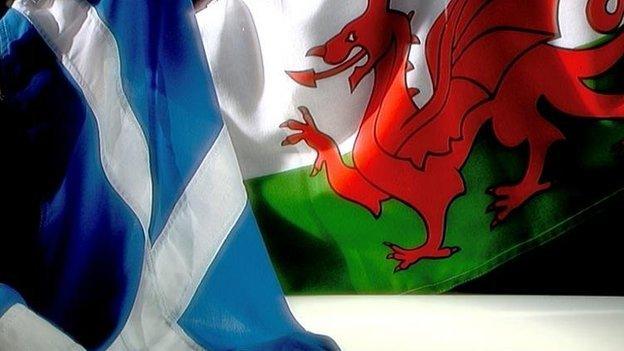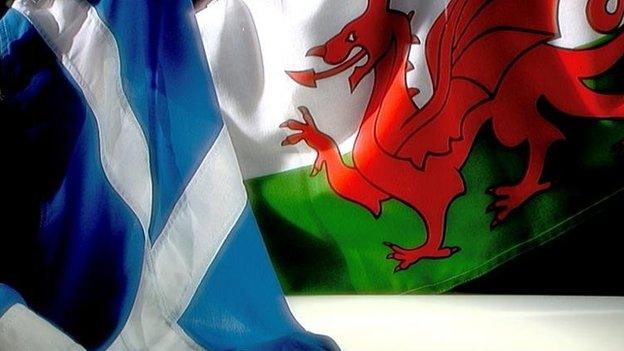Scots No vote sparks call for more powers for Wales
- Published
First Minister Carwyn Jones said there needed to be a coherent settlement
First Minister Carwyn Jones has spoken about what the Scottish independence No vote could mean for future devolution in Wales.
Politicians across all parties have said the referendum will mean fundamental changes to the current devolution settlement.
Prime Minister David Cameron said Wales must have more say in its own affairs.
Lee Waters, director of the Institute of Welsh Affairs, said the change promised for Wales was vague
Mr Jones earlier tweeted, external he was pleased Scotland voted to stay in the Union.
In a speech on Friday morning he said Wales could not play second fiddle when the future of devolution was discussed.
Cultural commentator Dr Simon Brooks says the UK survival was almost a fluke
Welsh Liberal Democrat leader Kirsty Williams said Wales "must not be left behind" as the country discusses its future and all parties must speak with one voice in the call for power to be brought closer to home.
Plaid Cymru leader Leanne Wood, who had backed a Yes vote, called for all the UK nations to be involved in the "meaningful and significant decentralisation" of power and her party remained sceptical about the promises of new powers. She wants any offers made to Scotland to be offered to Wales, calling the funding arrangements "not fit for purpose.
Chief Secretary to the Treasury, Liberal Democrat Danny Alexander, defended the funding method known as the Barnett formula. He said it was a specific Welsh issue - of spending convergence - but the introduction of a "floor" under the formula would tackle that issue.
Welsh Secretary Stephen Crabb was relieved by the result after a "moment of constitution trauma", adding: "We must find a way to foster unity and stability, while enabling the ambitions and aspirations of each nation to be satisfied."
Former Welsh Secretary Peter Hain said Scotland had "spoken for the whole of the UK", with the result representing a "revolt against the Westminster elite", adding: "Yes, more powers for Scotland are being promised, Wales will need more powers and deserve more powers as well, and probably Northern Ireland too."
Director of the Institute of Welsh Affairs Lee Waters said there was a danger of more instability. "Even though the result seems clear this morning, I would say the Union is not secure," he said. "What David Cameron just signalled is a very dangerous Pandora's box of forces beyond his control.... There's been a nod to Wales, saying we're going to be at the heart of the debate, but it's not clear how we're going to be at the heart of the debate."
The BBC announced Scotland had voted to reject independence at about 06:15 BST on Friday. Nationally, the margin of victory was about 55% to 45%.
The result brought an end to a two-year campaign and talks will now begin on devolving more powers to Scotland.

Analysis: Tomos Livingstone, BBC Wales political correspondent
Scotland has voted to stay in the United Kingdom - but that doesn't mean it 's back to business as usual. Politicians have been falling over themselves to say that nothing will be the same again, and with good reason.
In Scotland itself there's a job of work to be done to heal the wounds of a divisive campaign. It won't be easy when the country as a whole voted no but the largest city, Glasgow, went for yes.
But attention's already turning to what it means for the rest of the UK. The prime minister is due to make a statement later this morning, and he's expected to announce a version of "English laws for English issues".
Welsh Conservative leader Andrew RT Davies said there was already a template for change
That would mean stopping Welsh MPs voting on some issues at Westminster; a beguilingly simple solution to English resentment, but there may be trouble ahead. Working out what's exactly is or isn't devolved to Wales isn't easy - a few disputes have already ended up in the Supreme Court.
There have been more hints overnight that the Wales Bill will be altered before it becomes law, to remove restrictions on the income tax powers being proposed for the Welsh government.
And then there's the money question - has the Scottish referendum finally cleared the way for a new system of funding the Welsh government, to replace the Barnett formula that so many Welsh politicians argue is unfair?
There's a feeling that there's plenty up for grabs - but the exact shape of things to come is far from being decided.

- Published18 September 2014

- Published10 September 2014

- Published19 September 2014
